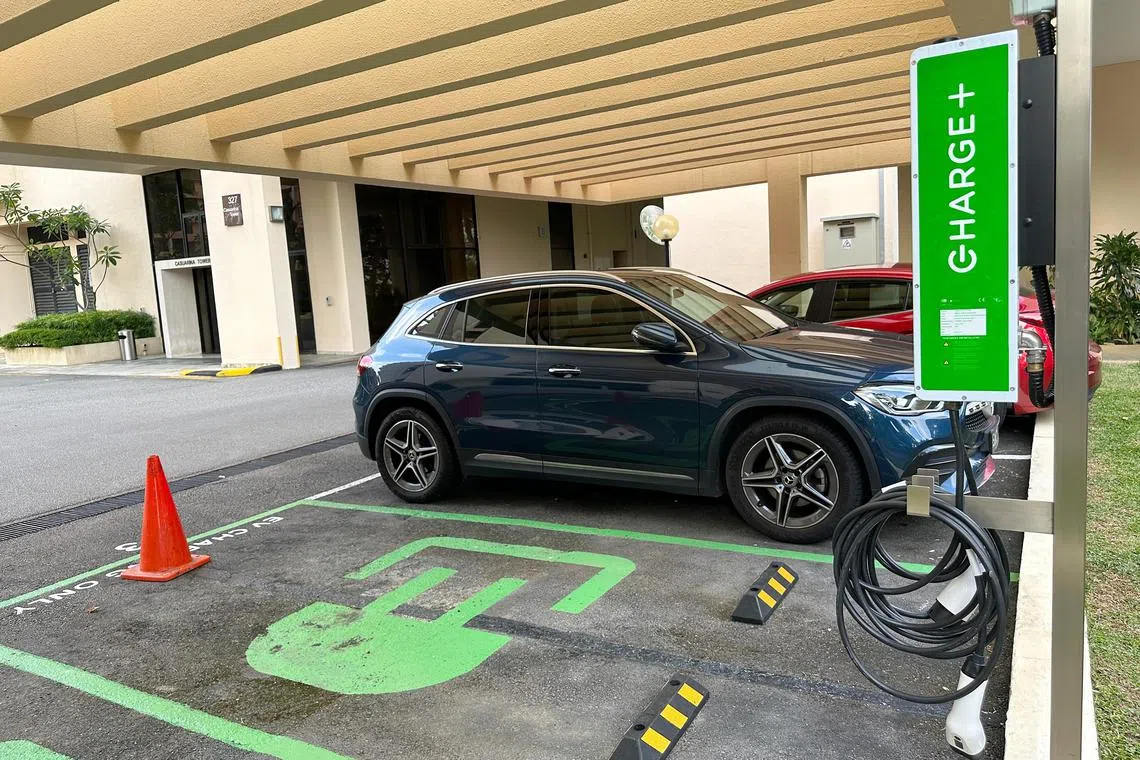Charge+ takes over 3 EV charging companies in Singapore as licensing regime kicks in
Sign up now: Get ST's newsletters delivered to your inbox

With the acquisition, Charge+ has about 2,500 EV charging points in Singapore.
ST PHOTO: ST FILE
SINGAPORE – Local electric vehicle (EV) charging operator Charge+ has taken over 140 chargers from three companies, at a time when firms are exiting the business as more stringent regulations kick in.
These belonged to eChargz, QuickCharge and PaC Components (PacCom) and are located in 42 properties, being a mix of condominiums and commercial buildings, including the Esplanade. Most are slow chargers, rated at between 7kW and 22kW.
Charge+ chief executive Goh Chee Kiong told The Straits Times that all the acquired charging points have been switched over to Charge+’s system.
EV drivers can use the Charge+ smartphone app to initiate a charge at these locations. Residents in the affected properties have been informed of the change.
Charge+ says that the move brings the total number of charging points in its Singapore network to “about 2,500”.
When asked by ST, Mr Goh said that Charge+ had been approached by other operators to take over their chargers, but did not elaborate.
It is not known how many EV charging operators (Evcos) operated before the licensing regime was implemented.
In October, the Land Transport Authority (LTA) listed 32 charging operators who are allowed to apply for its grant to subsidise charger installations at condominiums.
These included large operators like Charge+, SP Mobility and Shell, as well as the likes of QuickCharge and PacCom, but not eChargz.
The deadline for Evcos to be registered was Dec 7, which is 12 months after the law governing EV charging commenced in December 2023.
The licence, which is valid for three years and is renewable, costs $15,000. This excludes the application fee of $1,500 to get the licence.
In its press release, Charge+ said that there were some consolidations among Evcos arising from the enactment of the law.
To be registered, an operator must fulfil requirements that include having at least $2 million third-party insurance coverage, sharing periodic and real-time charging-related data with the LTA and maintaining the service uptime of its chargers.
Evcos said that these requirements add complexity and cost to their operation, which may not be viable for players without sufficiently large networks.
Nearing the deadline, industry insiders had said that some operators with a smaller network of chargers in condominiums were looking to divest.
These tended to be companies that were in related businesses like electrical engineering who got into offering EV charging services as an extension of their main line of work.
PacCom, a distributor of electronic and electrical components, started providing EV chargers in 2017, while eChargz was started in 2021 to provide EV charging solutions.
QuickCharge is part of Hong Seh, a motor distributor for various brands of electric vehicles, including cars, vans and buses.
Charge+ was set up in 2018 to build up the EV charging infrastructure in Singapore and the region. It currently has EV charging operations in Malaysia, Thailand, Vietnam, Indonesia and Cambodia.
Ms Lindy Lee, QuickCharge’s director, said the company will continue to sell and install EV chargers as part of its larger automotive business.
Speaking to ST on Dec 10, she said that the decision not to apply for the licence to be an Evco was taken after considering the resources and scale needed to run a viable charging business.
In its e-mail response to ST on Dec 2, LTA said that it had received 37 applications for the licence to be an Evco to date.
“LTA is still evaluating the applications received to ensure that the licensees meet the licensing requirements and will be progressively issuing the licences before the end of 2024.
“Existing Evcos providing charging services prior to Dec 8, 2023, are allowed to continue operating while their licence applications are under review, as long as they have submitted their Evco licence application to LTA before the due date of Dec 7, 2024,” LTA’s spokesperson added.
Those found offering an EV charging service without a licence may be fined up to $30,000 or be jailed for up to six months, or both.
Besides regulating the Evcos, the law also governs the supply, installation, certification and use of EV chargers here.
Singapore has a target to put in 20,000 EV charging points in private premises and 40,000 charging points in public carparks by 2030.
As at end-October 2024, there were 13,625 registered chargers in Singapore, of which 1,738 chargers are located in condominiums.
There are 28,464 electric vehicles, or 2.9 per cent of the total vehicle population in Singapore.



